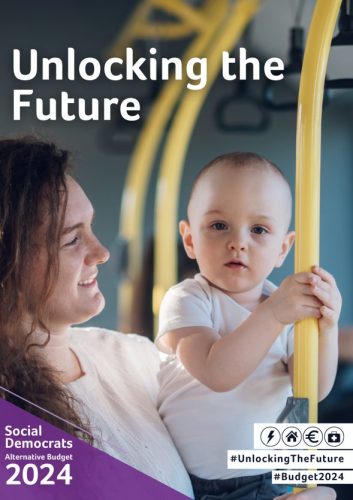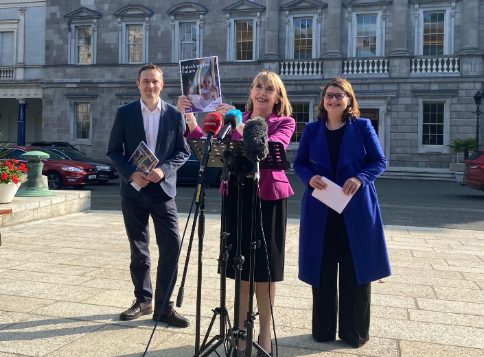Housing, children and climate take centre stage
Read the full Alternative Budget here

Housing, children and climate action are the main focus of the Social Democrats’ Alternative Budget, ‘Unlocking the Future’, which is published today.
The party’s key priorities for 2024 include:
- Deliver 10,000 affordable homes next year – a near doubling of the Government’s current target – and increase the renters’ tax credit to cover one month’s rent.
- Increase paid leave for parents to 12 months, with an increase in the rate of Maternity, Adoptive, Paternity and Parents’ Benefit to €350 per week from the current rate of €262.
- Begin to abolish child poverty by creating a new ‘Deis-plus’ programme for pre-school, primary and secondary schools in the most disadvantaged areas; and increase targeted payments to vulnerable children by 30 per cent.
- Spend a large portion of the surplus on a €5 billion climate transformation fund – setting up a new semi-State company to invest in off-shore wind and more than double the grants for solar energy.
- Increase core social welfare payments by €25 per week and introduce an additional weekly Cost of Disability payment of €30.
- Tackle low incomes by increasing the Minimum Wage by €2 to €13.30.
- Pay parity for staff in Community and Voluntary organisations to help address the recruitment crisis in healthcare and disability services.
- Introduce a €1 off-peak fare to incentivise public transport use at off-peak times while investing to increase capacity across bus, Luas, Dart and rail services.
Speaking at the launch, Housing Spokesperson Cian O’Callaghan said:
“The housing disaster is the single biggest issue we face as a society. It is causing devastation across the country. We need an additional €1.2 billion investment in the provision of affordable homes – a near doubling of the current inadequate Government target – to ensure the locked-out generation can afford a home to rent or buy.
“We must also do something about extortionate housing costs. Rents are now in the stratosphere and the renters’ tax credit must also be increased so that it puts one month’s rent back in renters’ pockets.”
Children and Climate Spokesperson Jennifer Whitmore said:
“We need to radically transform supports for families. We want to increase paid parents’ leave so it covers the first 12 months of a child’s life. We also want to increase the rates of maternity, paternity and parents’ benefit to €350 from its current rate of €262.
“Having a baby, as well as being a very joyous time, is hugely expensive. We also know that more than 50 per cent of fathers don’t take the two weeks paternity leave they are entitled to currently – and we can assume that cost is a major factor in that.
“We want to do something that helps new parents take time to spend with their families when a baby is born. We believe this measure can do that.
“Childcare costs must also come down and we are proposing a further 30 per cent cut – to cap average fees at €250 – and a separate €100 million capital investment to begin the roll-out of a not-for-profit public model of childcare.
“The budgetary surplus gives us a once-in-a-lifetime opportunity to make a big investment in renewable energy. We are proposing the establishment of a €5 billion Climate Transformation Fund that includes setting up a new semi-State company to invest in off-shore wind, and a doubling of grants for solar.
“We are running out of time to meet our climate targets and make essential investments in clean energy. Now is the time for the State to invest in renewables – to cut energy costs for families, improve our energy security and get a long-term and recurring financial return for the people of this State from its natural resources. As it stands, private companies are reaping most of those rewards.
Finance Spokesperson Róisín Shortall said:
“Disability services across the country are fragmented and threadbare. There has been almost no recognition from this Government of the additional costs of having a disability – which can be up to €11,000 per year. The Social Democrats would introduce a €30 per week ‘Cost of Disability’ payment, paid in addition to core welfare rates, which we would also increase by €25 per week.
“The provision of essential services – like assessments of need and therapies for children – are similarly deficient. As a matter of urgency, we would introduce pay parity for workers in the community and voluntary sector before they embark on an indefinite strike which will cause further chaos in service provision.
“The eradication of child poverty is also a key priority. Persistent poverty is not just an enabler of negative outcomes, it causes them. It has a disastrous impact on every aspect of life – emotional development; educational attainment; mental health; physical wellbeing; career opportunities; and income in later life.
“Not only does poverty have a huge human cost – in scarred and damaged lives – it also has an enormous financial cost for the State, estimated to be as much as €20 billion per year. We can, and we must, eradicate child poverty.
“In our budget, we propose measures that would make a real difference. We would introduce a Deis-plus programme for pre-school, primary and secondary schools in the most disadvantaged areas and increase targeted payments to vulnerable children by 30 per cent.
“Low incomes that are impossible to survive on given the extremely high cost of living in Ireland, are also a huge concern. We would increase the minimum wage by €2 to €13.30 per hour and introduce a living wage within the next two years.
“To help families with the ongoing cost-of-living crisis, we are also proposing cash payments of up to €600 per household for energy costs; a series of one-off payments for those on fixed incomes like pensioners, one-parent families and carers; and a significant 45 per cent increase in the fuel allowance.”
NOTE: Read the full Alternative Budget here
October 4, 2023

